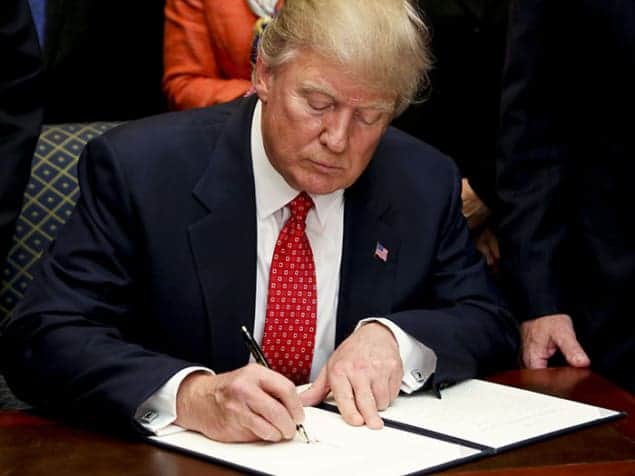
As the Trump administration’s governing priorities became more apparent through its actions and statements, US researchers’ sense of alarm has escalated. The administration’s revised executive order on immigration, its initial budget proposals, and its attitude towards climate change and the environment are all drawing criticism – much of it scathing – from the community. In addition to voicing complaints, scientists and scientific societies are preparing to reveal their feelings in a March for Science on 22 April in Washington DC – with close to 300 subsidiary marches to take place in other cities worldwide.
While the new executive order on immigration removes Iraq from the list of countries whose citizens are temporarily banned from the US, it still covers Iran, Libya, Somalia, Sudan, Syria and Yemen. It allows entry to individuals from those six nations with valid visas or green cards, which permit US residence. The order also allows immigration authorities to waive the ban on individuals on a case-by-case basis. However, two federal judges blocked the order’s provisions before they went into action and a long series of court hearings is likely.
A statement from the Institute for Advanced Study in Princeton, New Jersey, notes that the new order “continues to directly conflict with the [institute’s] founding principles and values, unwavering belief in non-discrimination and inclusion, and fundamental mission to provide a free and open environment for basic research in the sciences and humanities”. A statement from the Optical Society of America (OSA), meanwhile, asserts that while it welcomes the exclusion of Iraq, the order will “continue to pose a threat” to science and international collaboration. “Like its predecessor, [the order] hinders scientists and their work by restricting their ability to enter the US to study, attend conferences or pursue research interests,” the OSA says.
Scholars cut off
According to the Association of Public and Land-Grant Universities (APLU), more than 15,000 students from the countries in the revised order visited the US to study science in 2015 and 2016. “As an institution, we oppose the revised travel ban on the principles of justice and non-discrimination, and stand in unison for the advancement of knowledge without borders and prejudice,” says Peter McPherson, president of the APLU. “The pipeline of new students and scholars from [the six banned] countries, many of whom are in the midst of the college application process, is now cut off.”
President Trump’s proposed budget for the 2018 financial year, which begins on 1 October, is also worrying the US scientific community. While the document contains only broad details and Congress will almost certainly make changes to the budget, science appears likely to lose out. (See “Trump’s 2018 budget proposal concerns US scientists“) The proposal includes a reduction in spending on discretionary items of $54bn, which includes funding for such agencies as the Department of Energy (DOE), the National Science Foundation (NSF) and the National Institutes of Health (NIH).
“[The budget] means tremendous cuts in basic research, environmental research, energy and agriculture,” says John Holdren, who served as Barack Obama’s science adviser from 2009 to 2017. “[It] has the scientific community very worried.” Illinois Democratic congressman Bill Foster, the only physicist in Congress, is also fighting against large cuts to science. “The US has been at the forefront of innovation and progress largely due to investment in scientific research,” he told the House of Representatives Appropriations Committee recently. “Our scientific infrastructure requires long-term, sustained funding to ensure opportunities are not missed.” Foster and Illinois Democratic senator Dick Durbin have introduced a bill – with little chance of success – to increase the funding of five government research-related agencies by 5% annually.
If ever there was a case of the fox guarding the henhouse, this is surely it
Michael Mann, Pennsylvania State University
Climate satellites
The satellite division of the National Oceanic and Atmospheric Administration (NOAA) – which provides 90% of the data used in weather forecasts – stands to lose 22% of its current budget, or $513m. The Environmental Protection Agency (EPA) could lose 31.5% of its funding and Scott Pruitt, its new administrator, has exacerbated scientists’ suspicion of the Trump administration’s environmental agenda. Speaking to CNBC, he responded to a question on carbon-dioxide’s role in climate change with the comment: “I think that measuring with precision human activity on the climate is something very challenging to do, and there’s tremendous disagreement about the degree of impact. So no, I would not agree that [carbon dioxide] is a primary contributor to the global warming that we see.”
Pruitt has been no friend of the EPA, having sued it several times during his time as attorney general of Oklahoma. But he had rarely voiced his suspicion of anthropogenic climate change so starkly. “His latest statements merely confirm what I’ve said before,” Pennsylvania State University climatologist Michael Mann told Physics World. “Pruitt is an anti-science, anti-environmental zealot and a thinly veiled shill for fossil-fuel interests. If ever there was a case of the fox guarding the henhouse, this is surely it.”
Many scientists agree. Within two days of Pruitt’s making his comments on the CNBC television channel, his agency’s main phone number was flooded with protest calls. Several calls went to a voicemail box that was itself overwhelmed. As for Pruitt’s claim that carbon dioxide is not a primary contributor to climate change, Mann says: “Increasing carbon dioxide is most likely responsible for all of the warming we’ve seen over the past century, since natural factors were actually pushing us ever so slightly toward cooling.”
Data access
The new government’s early actions have given fuel to one further issue: concern about the accessibility of government data. The government is legally required to store all the data it gathers. But the disappearance of information from government websites has indicated to some scientists that data on now-sensitive topics such as climate change will become increasingly difficult to identify and download. Groups of scientists have begun to spend weekends archiving such data for their future colleagues.
Meanwhile, preparations continue for the March for Science, which will take place on 22 April – Earth Day. The event aims “to champion robustly funded and publicly communicated science as a pillar of human freedom and prosperity”. Nearly 300 satellite marches have been organized around the world and more than 50,000 individuals have offered assistance to the events, and close to 100 groups have endorsed the march. They include the American Physical Society (APS), whose steering committee voted unanimously to endorse the event last month.
United for science
“The March for Science champions robustly funded and publicly communicated science as a pillar of human freedom and prosperity,” a statement by the APS notes. “We unite as a diverse, nonpartisan group to call for science that upholds the common good and for political leaders and policymakers to enact evidence-based policies in the public interest.”
Despite the gloom among many researchers, the White House has offered some positive scientific news. In late February, president Trump signed two bipartisan bills designed to encourage women in scientific fields. The first calls on the NSF to “encourage its entrepreneurial programmes to recruit and support women to extend their focus beyond the laboratory and into the commercial world”. And the second directs NASA to “encourage women and girls to study science, technology, engineering and mathematics, pursue careers in aerospace, and further advance the nation’s space-science and exploration efforts”.



